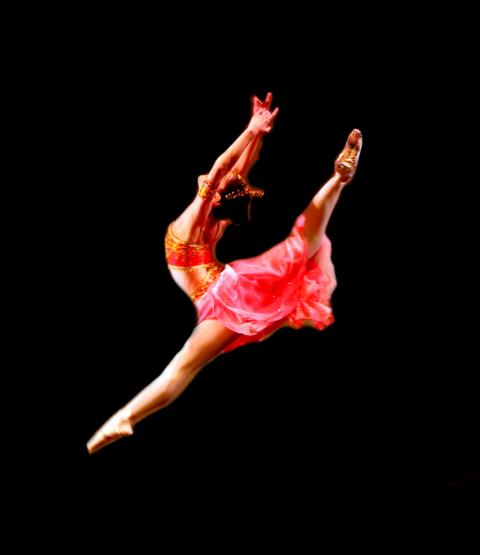Serious ballet students in Taiwan have faced an uphill battle for years in terms of getting enough class time and performance opportunities, even at the university level. Wu Ching-yin (吳青吟), founder and artistic director of the nine-year-old Taipei Royal Ballet (台北皇家芭蕾舞團), and her husband Hong Kang-jie (洪康捷) decided a competition would help inspire students to improve their technique. The 3rd National Ballet Competition is being held this weekend in Taipei for dancers ranging in age from 10 to 24. Eighty dancers from Taiwan, Hong Kong and Canada will by vying for cash prizes and certificates, ranging from NT$2,000 for an award of excellence up to NT$8,000 for the first place winners in each category. The actual competition tomorrow is not open to the public, but the prizewinners will perform for the public at two shows on Sunday in the theater at the Taipei Cement Building.
■ 3rd National Ballet Competition, Sunday at 2:30pm and 7:30pm at the Shih-ming Hall of the Taiwan Cement Building (台泥大樓士敏廳), 3F, 113 Zhongshan N Rd Sec 2, Taipei City (北市中山北路二段113號3樓).
■ Tickets are NT$600 and NT$800, available at the NTCH box office or online at www.artsticket.com.tw. Only NT$800 seats are left for the matinee performance

Courtesy of Taipei Royal Ballet

On April 26, The Lancet published a letter from two doctors at Taichung-based China Medical University Hospital (CMUH) warning that “Taiwan’s Health Care System is on the Brink of Collapse.” The authors said that “Years of policy inaction and mismanagement of resources have led to the National Health Insurance system operating under unsustainable conditions.” The pushback was immediate. Errors in the paper were quickly identified and publicized, to discredit the authors (the hospital apologized). CNA reported that CMUH said the letter described Taiwan in 2021 as having 62 nurses per 10,000 people, when the correct number was 78 nurses per 10,000

As we live longer, our risk of cognitive impairment is increasing. How can we delay the onset of symptoms? Do we have to give up every indulgence or can small changes make a difference? We asked neurologists for tips on how to keep our brains healthy for life. TAKE CARE OF YOUR HEALTH “All of the sensible things that apply to bodily health apply to brain health,” says Suzanne O’Sullivan, a consultant in neurology at the National Hospital for Neurology and Neurosurgery in London, and the author of The Age of Diagnosis. “When you’re 20, you can get away with absolute

May 5 to May 11 What started out as friction between Taiwanese students at Taichung First High School and a Japanese head cook escalated dramatically over the first two weeks of May 1927. It began on April 30 when the cook’s wife knew that lotus starch used in that night’s dinner had rat feces in it, but failed to inform staff until the meal was already prepared. The students believed that her silence was intentional, and filed a complaint. The school’s Japanese administrators sided with the cook’s family, dismissing the students as troublemakers and clamping down on their freedoms — with

As Donald Trump’s executive order in March led to the shuttering of Voice of America (VOA) — the global broadcaster whose roots date back to the fight against Nazi propaganda — he quickly attracted support from figures not used to aligning themselves with any US administration. Trump had ordered the US Agency for Global Media, the federal agency that funds VOA and other groups promoting independent journalism overseas, to be “eliminated to the maximum extent consistent with applicable law.” The decision suddenly halted programming in 49 languages to more than 425 million people. In Moscow, Margarita Simonyan, the hardline editor-in-chief of the